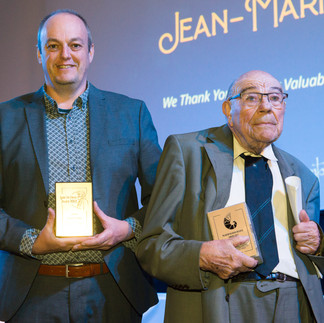THE 2022 LOUIS DE PAUW & PALAEONTOLOGICA BELGICA AWARDS
- Palaeontologica Belgica
- 17 okt 2022
- 4 minuten om te lezen
A tribute to citizens doing science
On Saturday afternoon, the 15th October 2022, a very special award ceremony took place at the 'Vrije Universiteit' of Brussels (VUB). For the second time, an award was presented to a person who has dedicated himself to scientific research within paleontology. Through this initiative, Palaeontologica Belgica hopes to promote science in all its aspects to the general public, and advocate the valorization of research done by citizen scientists within other scientific domains.
Citizen Science
The term citizen science, has become a part of our vocabulary in recent years. Content-wise, it encompasses an old concept that has been part of scientific research for many decades. It is in fact a concept that's already been practiced for hundreds of years, but for a very long time there was no appropriate and/or comprehensive definition for it. We can conveniently say that 'citizen science' encompasses a broad spectrum of participation in scientific research conducted, supported, or utilized by citizens with no academic background or recognized training within the relevant research domain
The definition may seem a bit vague, but many people have been introduced to its workings either consciously or unconsciously in recent years. Just think of the backyard bird spotting or shell collecting days, or the project to measure air quality in Flanders. All these initiatives make use of citizens with an interest in science to advance fundamental scientific research. But these awards take it one step further, as there are a lot of individuals in our country who, without any academic background in a specific branch of science, carry out their own research that is published internationally in scientific journals. They often do so without the financial support from the government purely for their own pleasure. To thank these unique citizens for their research, the Louis De Pauw award, was created.

Louis De Pauw
Louis François De Pauw (1844-1918) was the forgotten preparator at the Museum of Natural Sciences, who spent months descending into the Bernissart coal mine to excavate the world-famous Iguanodon dinosaurs with a team of experienced miners and preparators. Upon arrival of the bones in Brussels, he developed a method to treat the bones against pyrite decay and then mounted them on a self-built metal framework. He had previously won acclaim for assembling the woolly mammoth of Lier, but this feat earned him international respect and recognition.
Unfortunately, his work was somewhat forgotten by the general public and during his lifetime he stood in the shadow of his colleague Prof. dr. Louis Dollo (1857-1931), who is much better known within natural science circles. To bring his name out of oblivion, it was decided to name the prize for 'citizen scientists' after him. Last year during the first edition, his name was restored under the approving eye of his two great-grandsons and state science policy secretary Thomas Dermine.

Inclusiveness
Yet there is still much work to be done to valorize citizen scientists and their work among the professional research community, policymakers and the general public. Often, a lack of information on the subject, forms the basis for prejudices and incorrect or one-sided views. Indeed, in a not so distant past, the image of science was very narrow. A good example of this is the appearance of the scientist in popular culture, invariably depicted with a standard white lab coat, tousled hair, a bit unworldly and often socially introverted. This should therefore come as no surprise, because for many years science was something exclusive and elitist, practiced only by people who had time and money to study and conduct research.
Fortunately, the participation of non-professional researchers has always taken place. Today, we must ensure that in the (near) future we can simply speak of scientific research and no longer should we have to make a distinction between the people who carry out the research.
Laureates
Frederik Mollen received the 2022 Louis De Pauw award In recognition of his work as a citizen-scientist in Belgian paleontology. His research resulted in numerous publications within several prestigious scientific journals where he often also works as a reviewer. He took it upon himself to connect collectors & researchers in paleontology and natural science. He is also a recognized CITES expert, and he organised fieldwork activities onto which he invites both professional and non-professional scientists. A few years ago, he founded a brand new research organization called Elasmobranch Research (ERB), constituting a reference collection of extant material, donating specimens to various colleagues and museums around the world. In his free time he also enjoys giving lectures on Ichthyology to kids, and put collectors into the spotlight who participate in research. during his speech, Frederik held a small tribute to the late dr. Jacques Herman who passed away earlier this year. Dr. Herman was as a mentor of great importance to Frederik and recieved a standing ovation. Frederik highlighted the importance of societies like Tellus (now HONA) and Belgische Vereniging voor Paleontologie vzw in their role as a hub for promoting (citizen) science.

The Palaeontologica Belgica Award which we award to a professional scientist who takes the time and effort to popularize his field to the general public, and proactively collaborate with citizen scientists. This year the award went out to Prof. dr. em. Jean-Marie Charlet of UMons (Faculté Polytechnique) who has done tremendous work in popularizing geology and paleontology in the Hainaut region and beyond. He established a geological garden several years ago and works closely with the Cercle géologique du Hainaut (CGH). He has already given numerous lectures, organised excursions and gives courses to young people interested in the palaeontological and geological riches of the region. He also founded an organisation to protect the caves in the limestone around Mons (La Malogne). Ever since the 19th century, skeletons of large reptiles (Hainausaurus, Turtles, etc.) have been found in this limestone. With his blessed age and seemingly tireless efforts, he is certainly worthy of the award.

Networking Event
Contrary to last year, a reception was held to stimulate networking between all the members of the audience. We hope that everybody had a pleasant day, celebrating citizen science and paleontology in Belgium
We would like to thank the SWAMP student organisation, VUB and SciVil for supporting this event !






























Opmerkingen